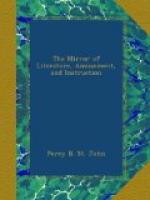Besides this government establishment at Rome, there are hundreds of artists, or artisans, who carry on the manufactory of mosaics on a small scale. Snuff-boxes, rings, necklaces, brooches, earrings, &c. are made in immense quantity; and since the English flocked in such numbers to Rome, all the streets leading to the Piazza di Spagna are lined with the shops of these Musaicisti, &c.
Oriental shells are made at Rome into beautiful cameos, by the white outer surface being cut away upon the deeper coloured internal part, forming figures in minute bassi relievi. The subjects are chiefly taken from ancient gems, and sometimes from sculpture and painting. The shells used for this purpose are chiefly brought from the Levant; and these shell cameos make remarkably beautiful ornaments. Hundreds of artists also find support at Rome, in making casts, sulphurs, &c. from ancient gems and medals, and in selling or fabricating antiques. Marble and stone-cutting are also beautifully executed both at Rome and Florence—Abridged, (but interspersed) from “Rome in the 19th Century."
* * * * *
THE GATHERER.
“I am but a Gatherer and disposer of other men’s stuff.”—Wotton.
* * * * *
TO ****
Moria pur quando vuol non e bisogna mutar ni faccia ni voci per esser un Angelo.—The words addressed by Lord Herbert of Cherbury, to the beautiful Nun at Murano. (See his Life.)
Translation.
Die when you will, you need not wear At heaven’s Court, a form more fair, Than beauty here on earth has giv’n, Keep but the lovely looks we see—The voice we hear—and you will be An angel ready made for heaven.
* * * * *
A CARD
Left at the Queen’s house during the King’s illness in March, 1801.
“Captain Blake of the Grenadiers, (George 1st.), was in the regiment of Colonel Murray at the battle of Preston Pans, in the year 1745. He was left among the dead in the field of action, with no less than eleven wounds, one so capital as to carry away three inches of his skull. Has been preserved fifty-six years to relate the event, and enabled by gracious protection, to make his personal inquiry after his majesty.”
* * * * *
MARGARET NICHOLSON.
The following is the original, epistle of this famous lunatic to the matron of Bedlam; No other proof is necessary of her insanity:—
Madam,—I’ve recollected perhaps ’tis necessary to acquaint you upon what account I continue here yet, maim, after making you privy to my great concerns, madam I only wait for alteration of the globe which belongs to this house, maim and if the time is almost expired I wish to know it maim. Tho’ I am not unhealthy, yet I am very weak, know maim therefore I hope it won’t be long maim.




